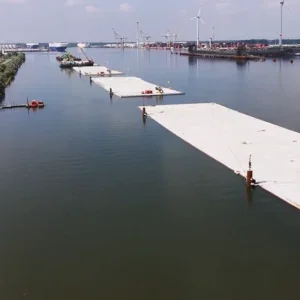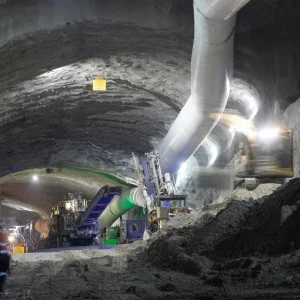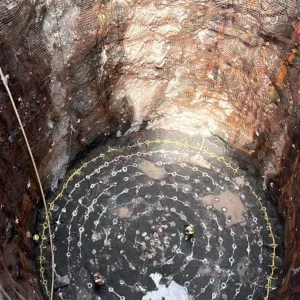In an aggressive move that has shocked foreign infrastructure investors, Ecuador’s President Rafael Correa has unilaterally ended all contracts with Brazilian construction giant Constutora Norberto Odebrecht SA. Correa has also seized the company’s assets, issued arrest warrants against four executives – two of whom are said to have fled the country – and threatened to default on a loan of more than US$200M owed to Brazil’s state development bank.
The action is the culmination of a drawn-out dispute over the 230MW San Francisco Hydroelectric Project, built by a consortium led by Odebrecht (T&TI June 2005, p25), which ceased power generation this June after just one year of operation. Conflict centred on the detection of major wear to one of the plant’s turbines, necessitating repair of rotor blades, and fractures in the rock within partially-lined sections of the project’s 11.5km long headrace tunnel.
The Ecuadorian government alleged faulty construction and procurement methods, demanding that Odebrecht pay for the repairs, return an early completion bonus and pay additional fines of up US$200,000/day in compensation for energy shortfalls. The consortium, which also includes Alstom and VA Tech Hydro, in turn alleged force majeure – but agreed to undertake the repairs while negotiations continued with the aim of re-starting normal operations by 04 October.
Much national media coverage of the situation ensued and in late September, less than a week before winning a national referendum that will facilitate significant socialist reform, President Correa issued an emergency decree to dispatch troops and take control of Odebrecht’s projects. In addition to San Francisco, the company’s estimated US$800M of assets include the Toachi-Pilaton and Baba hydro projects, the Carrazal-Chone water transfer project and a domestic airport.
While Odebrecht’s employees continued construction and repair works under military guard, Correa banned four Odebrecht executives from leaving the country. Brazilian news agencies have since said that two of these executives fled the country, while it is known that the other two have sought refuge in the Brazilian ambassador’s Quito residence to avoid arrest.
In response to Correa’s actions, Odebrecht issued a statement on 01 October agreeing to meet the government’s demands to complete repairs to the tunnel and electrical mechanical components regardless of culpability, as well as extend its guarantee on the project by one year and on the repairs by five. The company also stated that it has put a sum of US$43.8M in trust, to cover the early completion bonus and daily fines, until an audit by independent international experts decides whether it is liable for further penalties.
Despite this, Correa insists that Odebrecht will still be banned from operating in the country and is also threatening to default on a US$200M BNDES development bank loan used as finance for the San Francisco project. “In reality, it’s money that went to the company, but appears as if it were a loan by Brazil to Ecuador,” Correa said to state-owned Ecuador TV.
These decisions have shocked financial and legal commentators, such as Jose Valera, a Partner with leading international law firm King & Spalding LLP, who recently told the press: “Even if one wants to explain these actions as part of the president’s politicking leading up to the September 28 referendum, the facts demonstrate a total disregard for due process and an alarming lack of legal security. I would anticipate that the Odebrecht expulsion will indeed further stifle private sector interest in upcoming energy projects in Ecuador.”
Correa’s aggressive ‘state-centred’ policies have curbed investment in key sectors such as oil and mining, which are even more threatened in the light of the current economic climate that is drying up financing for riskier emerging nations. “Correa thinks he has all the power to force investors to bow to his interests,” said Jaime Carrera, head of the Quito-based Observatory of Fiscal Policy. “But what he is doing is scaring them away”
Falling world oil and metals prices, coupled with Ecuador’s dwindling crude output and uncertainty over new mining laws, could seriously affect its fiscal position next year, experts say.







